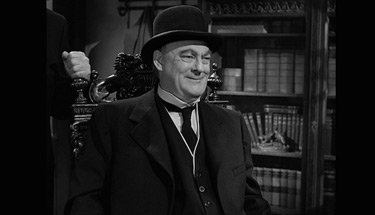Tom Mullen defends Bedford Falls’ most misunderstood and slandered businessman.
December is upon us and that means plentiful opportunities to watch the enduring classic, It’s a Wonderful Life. Unfortunately, the overwhelming majority of viewers completely misinterpret Frank Capra’s dystopian nightmare as a heartwarming Christmas tale.
The emotional appeal of angels getting their wings is undeniable. Crying out for correction, however, are the vicious slanders regarding the film’s real hero, Henry Potter.
We first hear of Potter from George Bailey’s father, Peter Bailey, who badmouths Potter with the usual falsehoods about businessmen. But during Bailey’s envious rant, we learn something important: Henry Potter is a board member of the building and loan. We later learn Potter is, in fact, a stockholder.
That puts a somewhat different light on his subsequent motion to liquidate the business upon Peter Bailey’s death. Yes, we hear George Bailey repeating the familiar socialist tropes his father did: that Potter only wants to close the building and loan because he “can’t get his hands on it†and considers the little people cattle, etc.
But Potter responds with some rather inconvenient facts: the building and loan has been making bad business decisions, providing what we’d now call subprime loans to people who can’t pay them back.
The Baileys squander their investors’ money on a do-gooder, subprime loan scheme to make everyone a homeowner.We don’t know how Potter became a stockholder, but the Bailey Building and Loan does not appear to be a publicly traded company. The most likely explanation is Peter Bailey asked Potter for capital, just as George Bailey does later in the film, in between rounds of disparaging Potter as a greedy capitalist. That would be perfectly consistent with today’s “progressives,†who rail against capitalists out of one side of their mouths while sucking up to them for money out of the other.
But regardless of how Potter became a stockholder, Peter Bailey has a fiduciary duty to him to run the business for maximum profit, providing Potter and the other stockholders a return on their investments, something George Bailey confirms they never intended to do. Instead, the Baileys squander their investors’ money on a do-gooder, subprime loan scheme to make everyone a homeowner. It worked out in fictional Bedford Falls about as well as it did in early 2000s America.
Meanwhile, the Baileys constantly slander Potter’s rental houses as “overpriced slums.†These are the same Baileys whose housing opportunities are more expensive than Potter’s.
Their accusations constantly beg the question: If Potter’s houses are so bad, why do so many people choose to live in them? It’s constantly implied Potter’s customers have no other choice, but what exactly does that mean? Why has no one else, including any of the businessmen on the board of the Bailey Building and Loan, developed rental properties that are higher in quality, lower in price, or both?
The inescapable truth is Potter is wealthy because he provides a product that most satisfies his customers’ preferences for quality and price. If there were an opportunity to provide a higher quality product at a lower price than Potter was charging, a competitor would do so and take market share away from Potter, until Potter either raised his quality, lowered his price, or both.
The Baileys burn with resentment that so many residents of Bedford Falls prudently choose to live in Potter’s less expensive housing than buy a house they can’t afford, financed by the Baileys’ Ponzi scheme. Thus, even after shirking their fiduciary duty to run the business properly, the Baileys spend decades assaulting Potter’s character in a transparent attempt to lure away his customers.
Without Potter, a large portion of Bedford Falls would be unemployed.When the Depression hits and the Bailey Building and Loan is exposed for the fractional reserve fraud it is, Potter offers to come to the rescue with a generous offer to buy out its customers. It is noteworthy there is a run on the Bailey Building and Loan and the local bank, but Potter is financially secure enough to save them both, proving once again he is the only honorable businessman in the film.
Read the whole thing.






Please Leave a Comment!